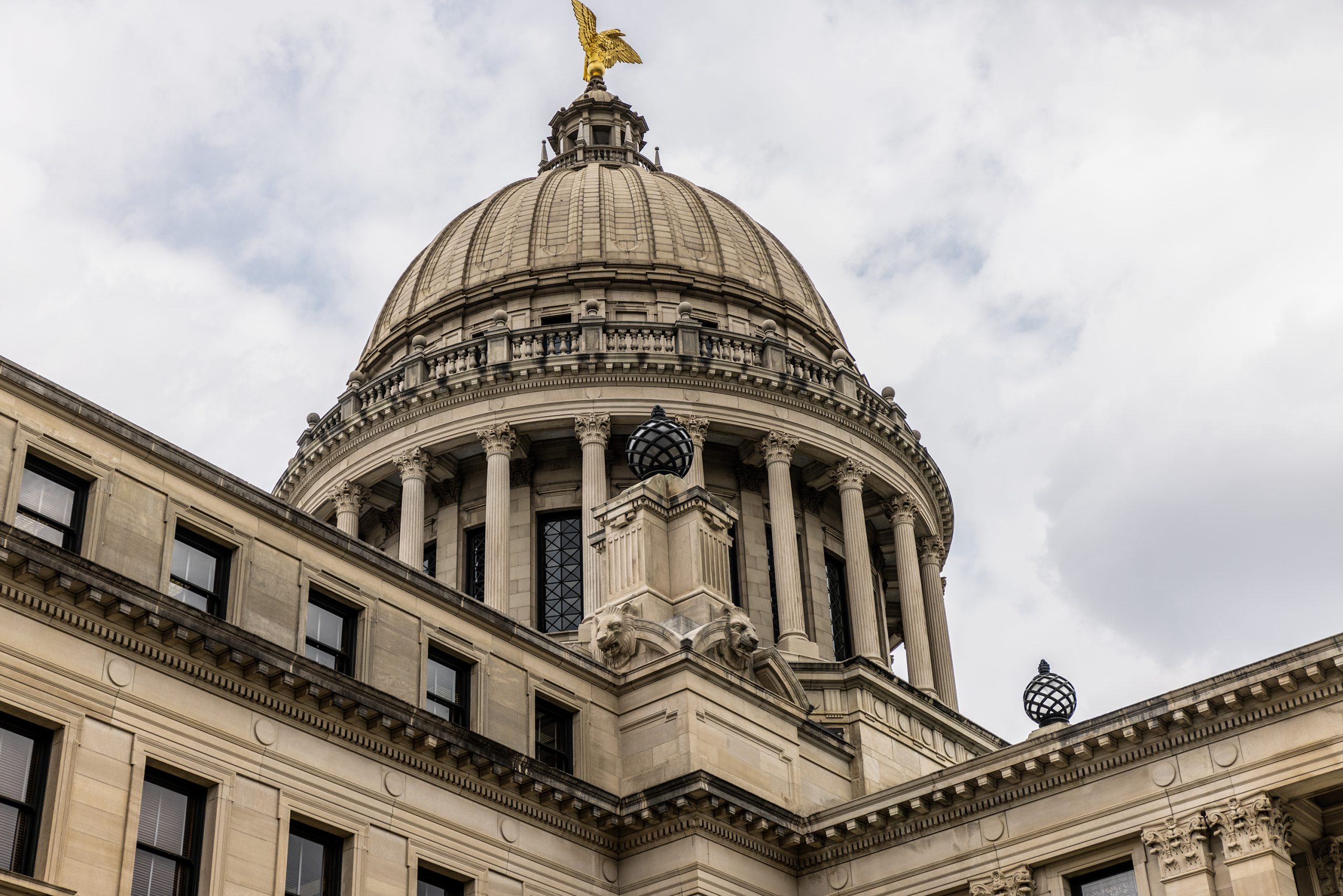Mississippi Today
Surge in state revenue takes experts by surprise — or does it?

With one month remaining in the fiscal year, the state has collected $653 million in revenue more than Mississippi's financial experts estimated would be collected.
The official guesstimate — er, estimate — is important because it represents the amount of revenue available primarily from general tax collections for the Legislature to appropriate to fund education, health care and other vital services. In other words, late in the 2022 session, legislators made an official estimate that was used to fund state government for the next fiscal year, starting July 1 of last year. With one month remaining in the fiscal year, the state is collecting 10.7% more than that official estimate.
It is important to understand that the revenue over the estimate is normally put into accounts to spend on capital expenses instead of programs to improve governmental services, such as services to curb the 900% increase in newborns with syphilis that occurred over a six-year period in Mississippi.
The official estimate is agreed upon by the legislative leaders and the governor in November before the start of the session. Later on, legislative leaders who serve on the Legislative Budget Committee have the authority to change the estimate — sans input from the governor — during the session before a final budget is adopted by the Legislature and signed into law by the governor.
State law spells out the process for the Legislature and governor to come together to adopt a revenue estimate. What state law does not address is that the revenue estimate for years has been based on recommendations of five financial experts. The recommendation of the five-member revenue estimating committee is generally, though not always, accepted by the political leaders.
That committee consists of:
- Corey Miller, the state economist.
- Liz Welch, the executive director of the Department of Finance and Administration.
- David McRae, the state treasurer.
- Chris Graham, the state revenue commissioner.
- Tony Greer, the executive director of the Legislative Budget Committee.
They meet behind closed doors to study economic trends and try to predict the future in order to make a recommendation. And as former Gov. Haley Barbour used to say, they will never be right.
Because of the uncertainty of their work, there are safeguards built in to try to avoid mid-year budget cuts. For instance, under state law only 98% of projected revenue is supposed to be appropriated. That 2%, about $150 million, provides a cushion if revenue does not meet projections.
While the revenue estimating group never gets it right, the panel has been more wrong than normal in recent years and has received some criticism. Revenue exceeded estimates by an unfathomable $1.5 billion or 24.6% for fiscal year 2022, and by $1.05 billion or 18.5% for fiscal year 2021. And with one month left in the 2023 fiscal year, revenue collections are again exceeding expectations by a substantial margin.
In fairness to the group, no one expected revenue collections to skyrocket like they did after the COVID-19 pandemic, when billions in federal funds were pumped into the state, spurring economic growth. Most states have experienced similar revenue surges. After a brief but dramatic COVID-inspired drop in collections in early 2020, revenue collections soared and have not come down, though in recent months it appears they might be returning to earth.
Before the pandemic, revenue exceeded projections by 1.6% in 2018 and by 5.5% in 2019. In fiscal year 2020 revenue was 0.72% below the projections. The pandemic hit late in the 2020 fiscal year and revenue dipped briefly before the unprecedented growth began.
In addition to the uncertainty of projecting state revenue collections more than a year in advance, it also is reasonable to assume the committee members are yielding at least slightly to the governing principles of the governor and the legislative leaders in making their recommendations.
The scripted format of the meetings where the recommendations are made is often obvious, and no one involved in following that script is going to win an Academy Award. A lower revenue estimate means the Legislature does not have as much money to spend.
And Reeves and legislative leaders such as Speaker Philip Gunn have worn cuts in state government like a badge of honor. They have not hidden their obsession with cutting or curbing state government spending.
Two of the members of the estimating committee, the DFA executive director and the revenue commissioner, are appointed by the governor. The head of the Legislative Budget Committee staff, of course, is tabbed by the legislative leadership. The treasurer is elected statewide, while the state economist falls under the authority of the Institutions of Higher Learning Board.
In other words, in making their official guesstimate, the experts face not only the uncertainties of projecting the economy months in advance but pressures — even if unspoken — of the political leaders they serve.
This article first appeared on Mississippi Today and is republished here under a Creative Commons license.
Did you miss our previous article…
https://www.biloxinewsevents.com/?p=249746
Mississippi Today
Renada Stovall, chemist and entrepreneur
Renada Stovall sat on the back deck of her rural Arkansas home one evening, contemplating life when she had a life-altering epiphany…
“I gotta get out of these woods.”
She heard it as clear as lips to her ear and as deep as the trees surrounding her property. Stovall's job as a chemist had taken her all over the country. In addition to Arkansas, there were stints in Atlanta, Dallas and Reno. But she was missing home, her parents and friends. She also knew, she needed something else to do.
“I thought, what kind of business can I start for myself,” said Stovall, as she watered herbs growing in a garden behind her south Jackson home. Some of those herbs are used in her all-natural products. “I know when I lived in Reno, Nevada, where it's very hot and very dry, there really weren't products available that worked for me, my hair, and my skin suffered. I've got a chemistry degree from Spelman College. I took the plunge and decided to create products for myself.”

In 2018, Stovall's venture led to the creation of shea butter moisturizers and natural soaps. But she didn't stop there, and in December 2022, she moved home to Mississippi and got to work, expanding her product line to include body balms and butters, and shampoos infused with avocado and palm, mango butter, coconut and olive oils.
Nadabutter, which incorporates Renada's name, came to fruition.

Stovall sells her balms and moisturizers at what she calls, “pop-up markets,” across the state during the summer. She's available via social media and also creates products depending on what of her ingredients a customer chooses. “My turmeric and honey is really popular,” Stovall added.
“The all-natural ingredients I use are great for conditioning the skin and hair. All of my products make you feel soft and luscious. The shea butter I use comes from West Africa. It's my way of networking and supporting other women. And it's my wish that other women can be inspired to be self-sufficient in starting their own businesses.”





This article first appeared on Mississippi Today and is republished here under a Creative Commons license.
Mississippi Today
On this day in 1954
MAY 17, 1954

In Brown v. Board of Education and Bolling v. Sharpe, the U.S. Supreme Court unanimously ruled that the “separate but equal” doctrine in Plessy v. Ferguson was unconstitutional under the 14th Amendment, which guaranteed equal treatment under the law.
The historic decision brought an end to federal tolerance of racial segregation, ruling in the case of student Linda Brown, who was denied admission to her local elementary school in Topeka, Kansas, because of the color of her skin.
In Mississippi, segregationist leaders called the day “Black Monday” and took up the charge of the just-created white Citizens' Council to preserve racial segregation at all costs.
This article first appeared on Mississippi Today and is republished here under a Creative Commons license.
Mississippi Today
Every university but Delta State to increase tuition this year
Every university in Mississippi is increasing tuition in the fall except for Delta State University.
The new rates were approved by the governing board of the eight universities, the Institutions of Higher Learning Board of Trustees, at its regular meeting Thursday.
The average cost of tuition in Mississippi is now $8,833 a year, a roughly 3% increase from last year. Students can expect to pay tuition ranging from $7,942 a year at Mississippi Valley State University to $10,052 a year at Mississippi State University.
In recent years, universities have cited inflation and rising insurance costs as reasons for the tuition increases. At Thursday's meeting, the board heard a presentation on how property insurance is becoming more expensive for the eight universities as Mississippi sees more tornadoes and storms with severe wind and hail.
READ MORE: Tuition increases yet again at most public universities
But it's an ongoing trend. Mississippi's public universities have steadily increased tuition since 2000, putting the cost of college increasingly out of reach for the average Mississippi family. More than half of Mississippi college students graduated with an average of $29,714 in student debt in 2020, according to the Institution for College Access and Success.
At Delta State University, the president, Daniel Ennis, announced that he will attempt to avoid tuition increases as the regional college in the Mississippi Delta undergoes drastic budget cuts in an effort to become more financially sustainable.
“We will resist tuition increases so that our most economically vulnerable students can continue to have access to the opportunities that a college degree can provide,” he wrote in a memo to faculty and staff on Monday. “We will move beyond basic survival and into a place where we have the capacity to take better advantage of our undeniable strengths.”
Delta State didn't increase tuition last year, either. Officials have been concerned the university is becoming too pricey for the students it serves.
Tuition for the 2024-25 academic year, by school:
- Alcorn State University: $8,105
- Delta State University: $8,435
- Jackson State University: $8,690
- Mississippi State University: $10,052
- Mississippi University for Women: $8,392
- Mississippi Valley State University: $7,492
- University of Mississippi: $9,612
- University of Southern Mississippi: $9,888
This article first appeared on Mississippi Today and is republished here under a Creative Commons license.
-
SuperTalk FM5 days ago
Martin Lawrence making 3 stops in Mississippi on comedy tour
-
Our Mississippi Home4 days ago
Beat the Heat with Mississippi’s Best Waterparks
-
Our Mississippi Home5 days ago
Charlie’s U-Pik: Opening Soon for the Summer Season
-
SuperTalk FM19 hours ago
State auditor cracking down on Mississippians receiving unemployment benefits
-
Mississippi News Video7 days ago
Local dentists offer free dental care in Amory
-
Mississippi News Video3 days ago
Jackson has a gang problem
-
Kaiser Health News4 days ago
Medicaid ‘Unwinding’ Decried as Biased Against Disabled People
-
Mississippi Today7 days ago
On this day in 1968





































